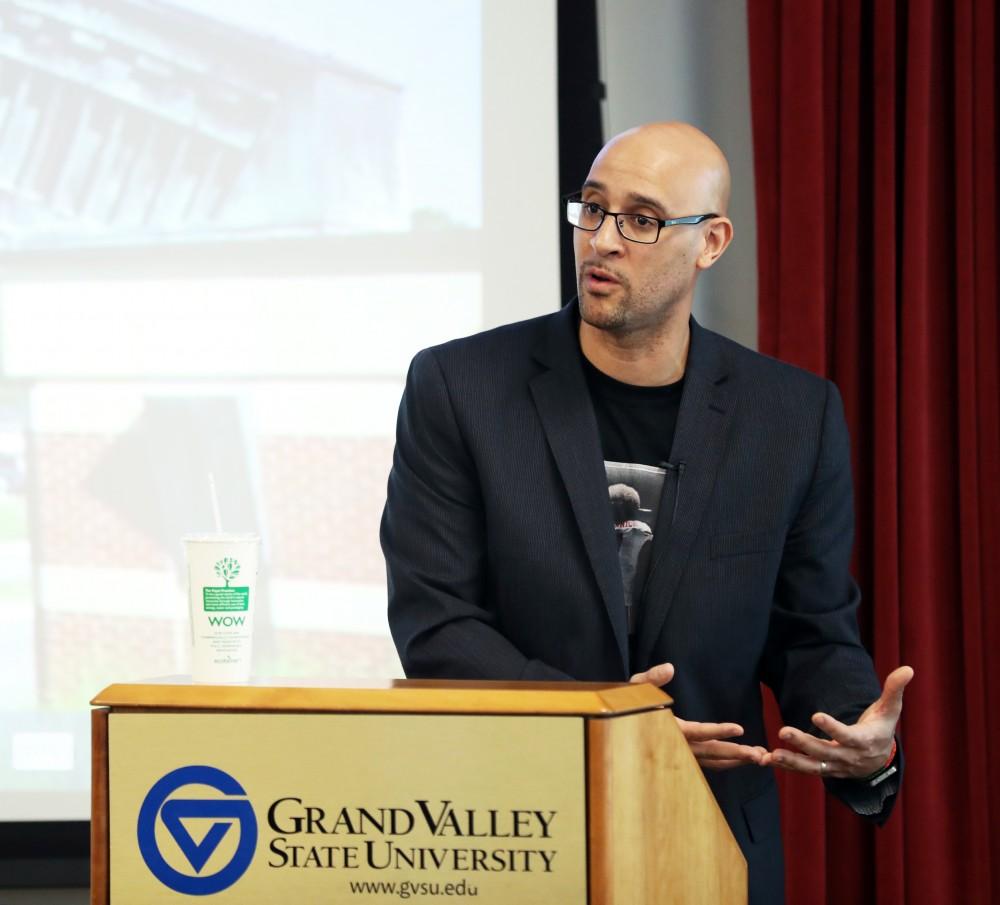Democracy 101 event to focus on student debt, health in U.S.

GVL/Kevin Sielaff – Professor Louis Moore speaks during the Democracy: 101 event on Wednesday, Feb. 22, 2017.
Dec 4, 2017
As college tuition continues to become more expensive, the question of how students manage to support themselves becomes increasingly relevant. Not only are tuition fees rising, but the cost of living a healthy lifestyle is, too.
To explain the economic reasons behind the rise of student costs and debt in relation to food inequality in the U.S., George Lundskow, professor in the sociology department at Grand Valley State University, will be speaking about the imbalance for students today as a part of GVSU’s Community Service Learning Center’s Democracy 101 series. The event will be held Wednesday, Dec. 6, at noon in the Kirkhof Center, Room 2270.
The topic arose in response to student interest, and it became a part of this collaborative series to explore what some of the challenges are that face democracy today.
“(The program) is to put forward a proposal and have a platform to come and share those thoughts to engage the campus community in conversation,” said Melissa Baker-Boosamra, associate director of student life, civic engagement and assessment. She thinks Lundskow will be a good source for this program because of the extensive research he has done on the topic and the questions he brings forward about the difficulty some Americans face when paying for college and food.
“If we are unable to meet the cost of an education, what does that do to our ability to participate in democracy?” Baker-Boosamra questioned. She said the event is a way for students to understand how this all plays into democracy, as it affects undergraduate and graduate students alike.
The event is certainly relevant to the struggle GVSU students face as well, with the rising costs of tuition and food affecting some Lakers.
“It definitely affects where I want to take my future after Grand Valley,” said Erin McIntosh, GVSU student. She has had to take on some student debt, as many others have, while trying to balance other necessities such as healthier foods, which tend to cost more.
However, McIntosh thinks students can make the change in the rise of student debt and affordability of a healthy lifestyle if they fight for one. She thinks the conversation at the event is an important one to have, as it will give students the chance to start making a change.
“We are the future,” she said. “If we want it to change so badly, we have to take the initiative and be proactive.”
The discussion, led by Lundskow, will explore the reasons behind the rise in student debt in the past years while also explaining the decline in the health of the U.S. as it relates to the quality and price of food in the country. Students will learn about how democracy in the U.S. and its policies have impacted debt and allowed for the worst food to be the best price, leading citizens toward a lower quality of life.
“This is a really great opportunity to pull together these seemingly distinct and different topics,” Baker-Boosamra said.
All who are interested may attend this event. It is LIB 100- and 201-approved, and it is free, as are the rest of the events in the Democracy 101 series. Pizza will also be served.

























